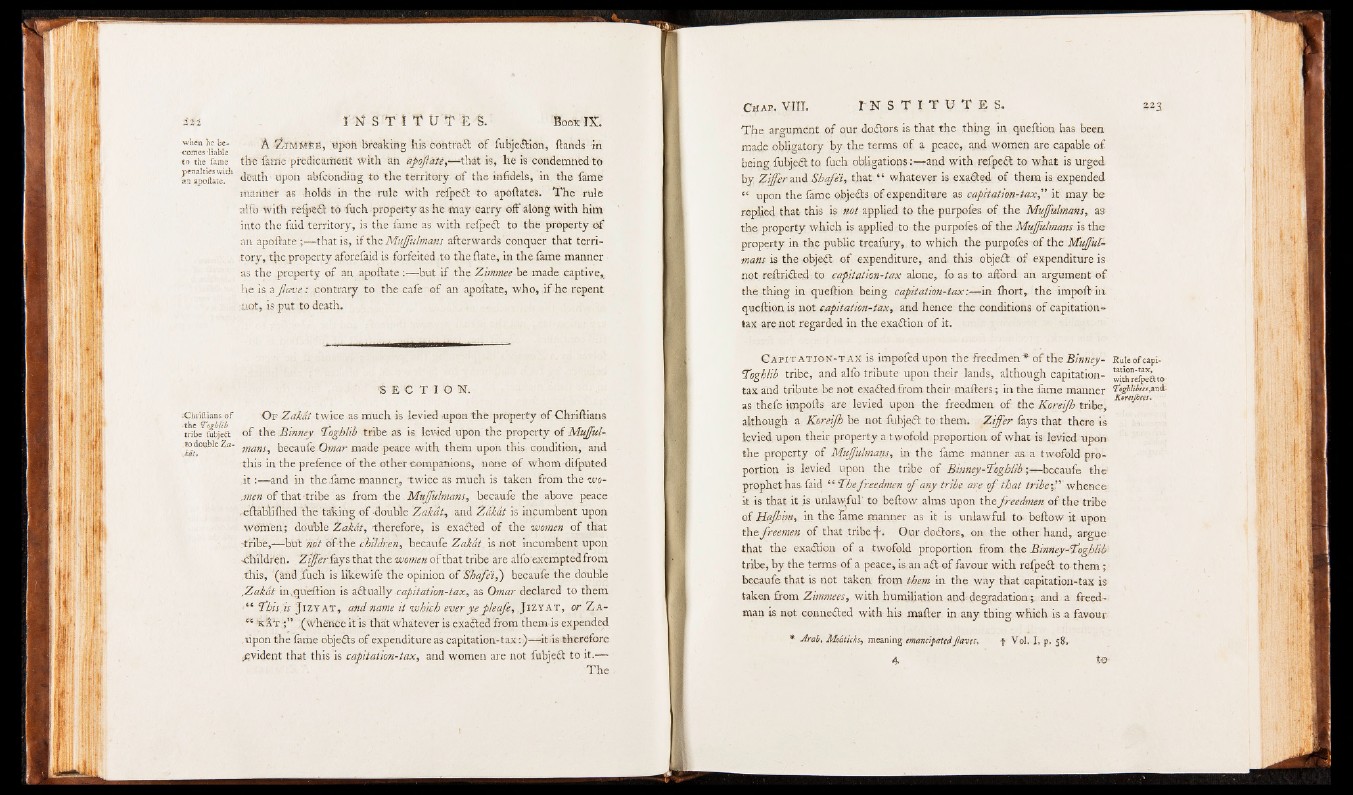
2 Book IX.
when he becomes
‘liable
to the fame
penalties with
an apoftate.
Ohriflians. o f
•the Togblib
tribe fubjett
so double Za-
,kat*
I N S T 1 T Ü T E S.
A ittVMkU, lipöti breaking his Cohtraft of fubjeftión, Hands in
thé fame predicament With an étpofatè,— that is, he is condemned to
death upon abfconding to the territory of the infidels, in the fame
manner as holds in the rule with refpe'ft to apoftates. The rule
-alfo With refpeft to ftich property as he may carry off along with him
into the faid territory, is the fame as with refpeft to the property of
an apoftate;— that is, if the Mujfulmans afterwards conquer that territory,
the.property aforefaid is forfeited to the ftate, in the fame manner
as the property of an apoftate,^-—but if the Zimmee be made captive,,
he is a Jlave: contrary to the cafe of an apoftate, who, if he repent
riot, is put to death.
S E C T I O N.
O f Zakat twice as much is levied upon the property of Chriftians
of the Binney foghlib tribe as is levied upon the property of Mujfulmans,
becaufe Omar made peace with them upon this, condition, and
this in the prefence of the .other companions, none of whom difputed
i t :— and in the-fame manner, twice as much is taken from the wonnen
of that-tribe as from the Mujfulmans, becaufe the above peace
.eftablifhed the taking of double Zakat, and Z&kat is incumbent upon
women,; double Zakat, therefore, is exafted of the women of that
tribe,— but not ofthe children, becaufe Zakat. is not incumbent upon
•children. Z ifferiays that the women of that tribe are alfo exempted from,
this, '(and jfneh is likewife the opinion of Shaje'if) becaufe the double
,Zakdt imqueftion is aftually capitation-tax, as Omar declared to them
“ 1 “bis is J i z y a t , and name it which ever ye pleaji, . J i z y a t , or Z a -
** i& * r;” f|Whence it is that whatever is exacted from them is expended
upon the fame objefts of expenditure as capitation-tax:.)— it is therefore
evident that this is capitation-tax, and women are not fubjeft to it.—
The
The argument of our doctors is that the thing in queftion has been
made obligatory by the terms of a peace, and women are capable of
being fufaj.eft to fuch obligations :--aa(J with-refpeft to what is urged
by Zifjer and Shafts, that “ whatever is exacted of them is expended
“ upon the fame pbjefts of expenditure as capitation-tax,” it may he
replied that this is not applied to the purpofes o f the Mujfulmans, as
the property which is applied to the purpofes of the Mujfulmans is the
property in the public treafury, to which the purpofes of the Mujfulmans
is the objeft of expenditure, and this object of expenditure is
not redrafted to capitation-tax alone, fo as to afford an argument oft
the thing in queftion being capitation-tax:— in ftiort,. the import in
queftion is not capitation-fax, and hence the conditions of capitation-
tax are not regarded in the exaction of it.
Capitation-tax is impofed upon the freedmen'* of the Binney- Ruleofcapi-
Toghlib tribe, and alfo tribute-upon their lands, although capitation-
tax. and tribute :be not exafted from their mafters; in the fame manner feghlihes.mi.
as thefe imports arc levied upon the freedmen of the Kareijh tribe,
although- a Koreifh be not fubjeft to them. Zijfer lays that there is
levied upon their property a twofold proportion, of what is levied upon-
the property of Mujfulmans, in the fame manner as. a twofold proportion
is levied upon the tribe of Bmney-foghiib;— becaufe the
prophet has. faid “ fhefrce.dmen o f any tribe are o f that trib e ft whence
it is that it is unlawful' to .beftow alms upon thtfreedmen of the tribe
of Hajhim, in the fame manner as it is unlawful to. beftow it upon
Hist freemen of that tribe y . Our doctors, on the other hand, argue
that the exaction of a twofold proportion from the Binney-foghlib
tribe, by the terms of a peace, is an aft of favour with relpe<ft to-them;
becaufe that is not taken from them in the way that capitation-tax is
taken from Zimmees, with humiliation and-degradation; and a freed-
man is not connefted with his mafter in any thing which is a favour.
* Arab, M m ticis, meaning emancipatedJlavts, f V o l. I. p. 58.